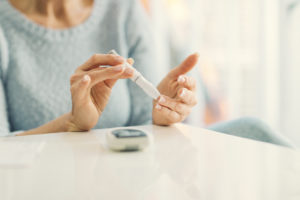Self-Care Month 2022: Let’s talk about self-care in healthcare
Tags:
Self-Care Month (24th June – 24th July) is a campaign from the World Health Organization (WHO), that celebrates and highlights the importance of self-care around the world and how, when educated and practiced properly, it can make a positive difference in everyone’s lives. Learn more below about what self-care is and why it is so important.
“Self-care work is the first line of defense on all health-related issues.” – Dr. Peter Salama, (late) Executive Director, WHO Universal Health Coverage and Life Course
What is self-care?
When you think of self-care, what do you think of? You might automatically think of getting a massage, practicing yoga, or taking a nap.
Although these activities can be contributing factors to a person’s well-being, self-care focuses on educating and supporting people to be able to safely self-medicate, test, and diagnose. This could look like anything from taking prescribed drugs and attending prenatal classes, to regularly checking your body for lumps and understanding how to self-test for Covid-19.
WHO defines self-care as: “individuals, families, and communities’ promoting and maintaining their own health, preventing disease, and coping with illness and disability, with or without the support of a health worker.”
Self-care contributes to an integrated approach within healthcare, strengthening connections between healthcare services, communities, and people, whilst focusing on considering the individual needs of each person and giving them the knowledge and ability to put their own health and well-being into their own hands.
Why is self-care so important?
Empowering people to be confident and safe in performing self-care is not only morally right but is also a must for both societies worldwide and the healthcare system.
To put this into perspective, 4.3 billion people currently still have inadequate access to essential facility-based health services. Every year 100 million people are plunged into poverty because they have to pay for healthcare services. These rather shocking figures illuminate the importance of self-care for those that are unable to access efficient services easily. Self-care is in place to help these people and reduce the number of preventable illnesses and death globally.
In addition, it is known that the healthcare industry is undergoing serious pressures, including staff shortages and overcrowding. These issues have grown due to factors including the global pandemic (Covid-19), ongoing climate change issues, and international conflicts.
Self-care is designed to enhance healthcare services, support them, and work alongside them to create healthier lifestyles and better outcomes for all.
WHO’s Self-Care Interventions (2019) for health are evidence-based tools that support self-care, including medicines, therapy, diagnostic kits, and supportive technologies. The Covid-19 pandemic evidenced the critical role that self-care interventions played in managing and monitoring the spread of disease and saving lives through active and personal self-care actions.
Practicing self-care whilst working in healthcare
Given the heavy focus on delivering high-quality patient care, it can be hard for healthcare workers to practice self-care and prioritise their own health as well. Ignoring your own needs can often result in symptoms of burnout, stress, or becoming unwell.
The question is how are healthcare workers supposed to deliver the best possible care to others whilst not taking care of themselves? Harvard Business Review breakdown practicing self-care into three categories:
Self-awareness
With countless distractions and duties, being self-aware is easier said than done. Dedicating time to journaling and other reflective activities on breaks and during shifts can help you become more aware of your emotional and physical needs. Studies show that actively naming your emotions gives your brain more insight into what your body needs.
Self-management
Again, the pressures of working within healthcare can be triggering. When you notice you’re being triggered or feeling emotional, take a break, practice deep breathing, play music, and try a mindfulness activity to calm and gather your emotions.
Moreover, it goes without saying that sufficient sleep and rest are key to being able to perform to your best ability.
Relationship management
Effective communication is essential for the safety of workers, patients, and their relatives, and is the basis of building strong relationships. Workers need to prioritise communication and collaboration between all parties to correctly fulfil responsibilities, reduce risks, and support safe care.
Building relationships with co-workers, managers, patients, and other healthcare professionals can help provide emotional support for workers, even if they don’t realise it. Talking with patients and workers about non-work-related topics is so simple yet offers a chance for everyone to feel at peace and valued. Remembering that others are there to help and support you is key, especially among teams.
How are our partners using compliance software to support staff well-being?
Creating a safer working environment is the foundation for building a culture of well-being. Radar Healthcare’s regulatory compliance solution centralises data and helps organisations utilise that data to help spot the issues and proactively develop steps to make improvements.
We believe in creating an honest and positive ethos by allowing teams to learn and work collaboratively, as well as giving them a tool to find a harmonious balance between collecting compliments and concerns for the benefit of workers and regulating bodies.
Choose from a range of modules, including risk management, audits, incident and events, action and improvement plans, and more to build the perfect package for your organisation.
I believe this system allows us to really create the balance between compliments and complaints and let people know that they are doing a good job. That’s why we chose Radar Healthcare: because it allows us to be more balanced.







